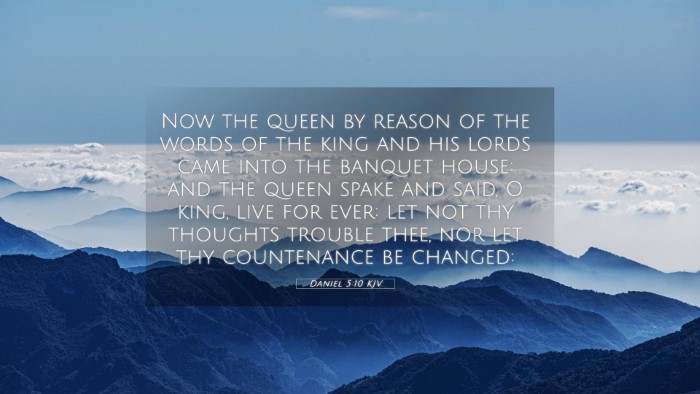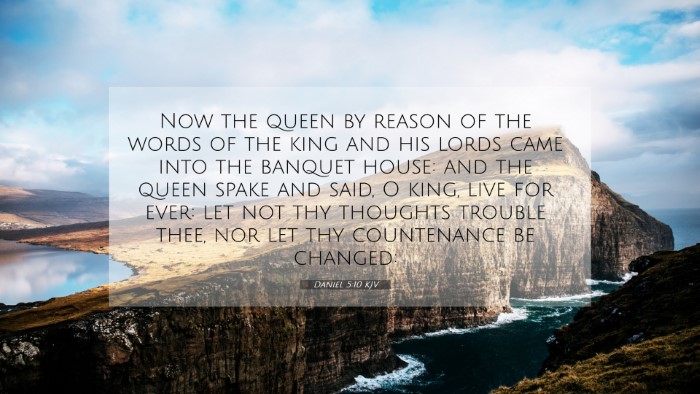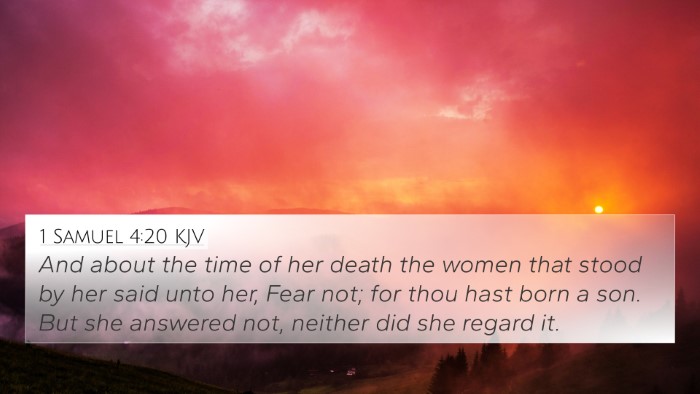Understanding Daniel 5:10
Daniel 5:10 states: "The queen, by reason of the words of the king and his lords, came into the banquet house: and the queen spake and said, O king, live for ever: let not thy thoughts trouble thee, nor let thy countenance be changed."
This verse occurs during a pivotal moment in the biblical narrative of Daniel, where King Belshazzar has seen the mysterious handwriting on the wall and is troubled by it. The queen's timely entrance serves to remind the king of Daniel's interpretive wisdom and the power of God.
Key Themes and Insights
- Courage in Troubling Times: The queen's words provide encouragement amidst the king’s anxiety. Her approach suggests a resolve to face the unknown.
- God’s Sovereignty: This verse subtly points to God's governance over kingdoms and the importance of divine wisdom, which is further reflected in the subsequent events of the chapter.
- Remembrance of Past Wisdom: The queen’s reference to Daniel indicates the importance of historical wisdom in times of crisis.
Commentary Insights
Matthew Henry notes that the queen's intervention emphasizes the importance of wise counsel and remembrance of past leaders' integrity and ability to interpret troubling signs.
Albert Barnes expounds on the significance of the queen's role as a reminder of Daniel's power and capability, which Belshazzar had overlooked during his revelry.
Adam Clarke highlights that the queen is in a position to contrast her wisdom and composure against the king’s fear, suggesting that in moments of panic, society requires not only wise judgment but also the calm demeanor of its leaders.
Bible Verse Cross-References
Daniel 5:10 connects with several other Scriptures that enhance its meaning:
- Daniel 1:17: This verse discusses the wisdom bestowed on Daniel and his friends, establishing his ability to interpret dreams and visions.
- Proverbs 11:14: Stresses the importance of a multitude of counselors, paralleling the queen’s reliance on wise figures like Daniel.
- Isaiah 47:13: Reflects on the folly of trusting in human wisdom without divine guidance, echoing the king’s misguided confidence.
- Proverbs 1:7: The fear of the Lord is the beginning of wisdom, representing the macro-issue of respect for God’s authority, which Belshazzar ignored.
- 1 Corinthians 1:25: Indicates that God’s foolishness is wiser than human wisdom, emphasizing the superiority of divine insight, as seen through Daniel’s interpretation.
- Matthew 12:42: Refers to the wisdom of Solomon, reinforcing the theme of recognizing and valuing godly wisdom.
- James 1:5: Encouragement to ask God for wisdom, which ties back to seeking counsel in times of distress like Belshazzar’s.
Thematic Bible Verse Connections
The passage in Daniel has thematic connections to several other Biblical narratives:
- The Encounter with Pharaoh: Exodus 8:19 showcases Pharaoh recognizing the wisdom of God in Moses, suggesting kings often overlook godly counsel.
- Esther 4:14: Reflects on the importance of speaking up in significant times, much like the queen’s brave entrance in Daniel 5.
- Job 12:13: Discusses the ultimate wisdom and strength in God, paralleling Daniel’s revelation of divine wisdom.
Cross-Referencing Biblical Texts
Understanding the connections between Bible verses can significantly enhance our grasp of God’s message. Utilize tools for Bible cross-referencing such as concordances and thematic guides to explore:
- How to find cross-references in the Bible effectively.
- Identifying connections between Old and New Testament teachings.
- Engaging in a comparative study of Pauline epistles to understand parallels better.
- Cross-referencing Psalms with New Testament to uncover deeper themes.
Conclusion
Daniel 5:10, while a brief passage, reveals significant insights into human nature and divine governance. Through the queen's timely and wise counsel, we find a call to recognize and submit to godly wisdom.
The act of cross-referencing Biblical texts not only enriches one’s understanding but also aids in sermon preparation and personal study, directing one’s heart towards the truths of Scripture.











